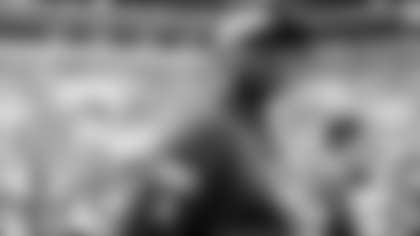If Paul Gruber was the kind of football player who tried to win every single snap, he had one very good reason: He knew how much everyone liked the long ball.
If a major league pitcher throws five good innings but gives up one home run, guess which pitch of his is going to be on the highlight shows. Gruber felt like he was in a similar situation during his NFL career.
"I would equate playing left tackle to being a pitcher in baseball," he said, drawing a parallel between serving up a dinger and letting a pass-rusher get to the quarterback. "You throw 70 pitchers or whatever and you just don't want to have one hit out of the park. The one sack – you grade out in a game at 95% and you have one bad play, and that's what you're watching on the news and on ESPN."
Great pitchers don't live in fear of the long ball, and Gruber didn't fear the sack, either. But he was fully committed to helping his team win, and that meant always giving his best. Every season, every game, every snap.
And that's why, as the Tampa Bay Buccaneers prepare to make Paul Gruber the fourth person inducted into their Ring of Honor at Raymond James Stadium, he is remembered most for who he was, not anything specific he did. That has been a common theme among those chosen for the Ring of Honor – Lee Roy Selmon was revered more for his character than his Hall of Fame skills; John McKay was the colorful icon who lives on through his famous one-liners; Jimmie Giles was the tight end who helped revolutionize the position.
And Paul Gruber was the rock.
"He was brought in to protect Vinny Testaverde's blind side, the quarterback the Bucs drafted first overall the year before," said Buccaneers Co-Chairman Bryan Glazer. "He went on to become everything you'd want in a left tackle, or a family man: Dependable, dependable, dependable.
"For a dozen years he lined up against the fiercest and loudest pass-rushers the opposition had to offer and quietly proceeded to give them all they could handle."
Glazer introduced Gruber at a press conference to announce the latter's Ring of Honor selection on Wednesday morning at One Buccaneer Place. It was the first time that Gruber had stepped foot into the new One Buc, as he spent his career training at the much smaller and less advanced original home of the team. Gruber also spent his first nine NFL seasons on teams with losing records, standing out, as Glazer put it, as a "diamond in the rough during the Creamsicle era." But he was also part of the franchise's turnaround in the mid-1990s, and while his career ended before the 2002 Super Bowl season he remains proud to have been a valued teammate with many of the key fixtures on that championship team.
In fact, he was there when that nascent team played its first playoff game at the end of the 1997 season, a 20-10 win over the Detroit Lions that came 18 years after the team's last postseason win. Gruber claims that game as the fondest memory of his 12-year career, and it was the final contest ever played in Tampa Stadium. He helped open Raymond James Stadium the next year, establishing a new era in franchise history, and now his own name will grace the stadium walls in perpetuity. That and his number 74 will be unveiled on the afternoon of October 16, 2012, when the Buccaneers take on the Kansas City Chiefs and use halftime to honor both Gruber and that 1997 squad.
For that, he says he is deeply humbled.
"To think in October my name and number will be a permanent fixture in Raymond James Stadium, I never imagined any of this when I was a kid throwing a football around my backyard in Wisconsin," said Gruber, who spent most of his time at the podium on Wednesday passing out thanks and sharing the credit for his success. "I'm really looking forward to stepping back on the field for the Chiefs game in October and getting to share this honor with my family and my friends, and especially with my teammates on the 1997 Bucs."
Some of those teammates were there on Wednesday to share in the proud moment of Gruber's Ring of Honor announcement. Derrick Brooks, who eventually became a similar type of team leader on the other side of the ball, was on hand, as was Mike Alstott, who had the good fortune of running behind many of Gruber's blocks. Even Tony Dungy, the coach of that '97 team and the man who Gruber credited with finally making his playoff dreams possible, took part in the event.
Dungy was very familiar with Gruber before he arrived in Tampa in 1996, having spent years trying to solve that particular problem as the Minnesota Vikings' defensive coordinator. He felt very fortunate that Gruber was still around and still playing at a very high level when he took over as the Bucs' head coach and set about trying to erase a culture of losing.
"Paul was a guy who did his job for so many years, and when they weren't winning never complained, never did anything other than go out there and play with excellence," said Dungy. "That's what I saw from the other sideline for years and years. Then when you come here and you see the work, and how he approached the job and how he worked with the younger players and how he was with his family…all of those things, it kind of made what you sell as a coach that much easier. That's exactly what we want; that's what's going to win for us. It was great to be able to point to that and not have to try to describe what we're looking for. Just follow that guy and we're going to be fine. He did what you asked for without have to be asked for it."
Alstott remembers the help Gruber gave him between Sundays far more than any particular block along the way.
"He instructed me and guided me and gave me great advice," said the six-time Pro Bowl fullback, a strong bet for his own Ring of Honor selection someday. "But it was more in a friendship way, and that was the great thing about him. The love and the friendship and the guidance he gave was more in a caring manner. He was so kind, not just a big, brutal tough guy."
The feelings were mutual. Gruber found his job a lot more rewarding when Dungy and Alstott helped build a powerful rushing attack in Tampa, as compared to the many years he experienced playing from behind and facing a rotating row of pass-rushers. More importantly, he appreciated the chance to finally taste the postseason. Of course, getting there would have been a lot tougher for Dungy if Gruber wasn't around as a steadying influence.
"I came here and he was one of the first guys I talked to – 'What's wrong? How do we get this thing turned around?'" recalled Dungy. "And he was very direct, just like he was today. He said, 'We're going to be fine. We just need some direction and we'll get going the right way.' You could sense the respect that everybody else on this team had for him."
The Bucs made it back to the playoffs in 1999, Gruber's final season, and even came within a few minutes of qualifying for the Super Bowl before the St. Louis Rams rallied for an 11-6 win in the NFC Championship Game. Gruber wasn't on the field for that game ("I'd like to think I could have made a difference in the outcome," he says) because he had suffered a broken leg in the regular-season finale, a division-clinching win in Chicago.
Even then, Gruber was an important part of the team's efforts.
"I remember that game like it was yesterday," said Alstott. "It was an emotional moment because we knew he was a part of something for so long, and then we got there and he couldn't be a part of it. But he was there, though, in spirit and in guidance of a young team."
In terms of career accolades, Gruber suffered from the effects of the many losing seasons, which kept the Bucs out of the national spotlight. He was never selected for the Pro Bowl, for instance, even though Dungy's defenders always voted for him in Minnesota, and even though he won a handful of All-Pro awards. That may have bothered him a bit at the time, but it's of no consequence to him now. And, of course, his impending Ring of Honor induction states quite clearly how highly he was valued by his own team and all the men he played alongside. Besides, his career was a complete success simply because he always played the game like that MLB hurler who isn't willing to let even one pitch get away from him. He was too dependable to approach it any other way.
"I think the thing that I miss the most is just the competitive nature of it," said Gruber on Wednesday. "A month or two ago I was having lunch with John Lynch and we were talking about that. There's nothing outside of football that you're ever going to do that will replace that. For me, it wasn't so much the accolades, it was winning and losing as a team, and the personal challenge of laying it all on the line on Sunday."






















